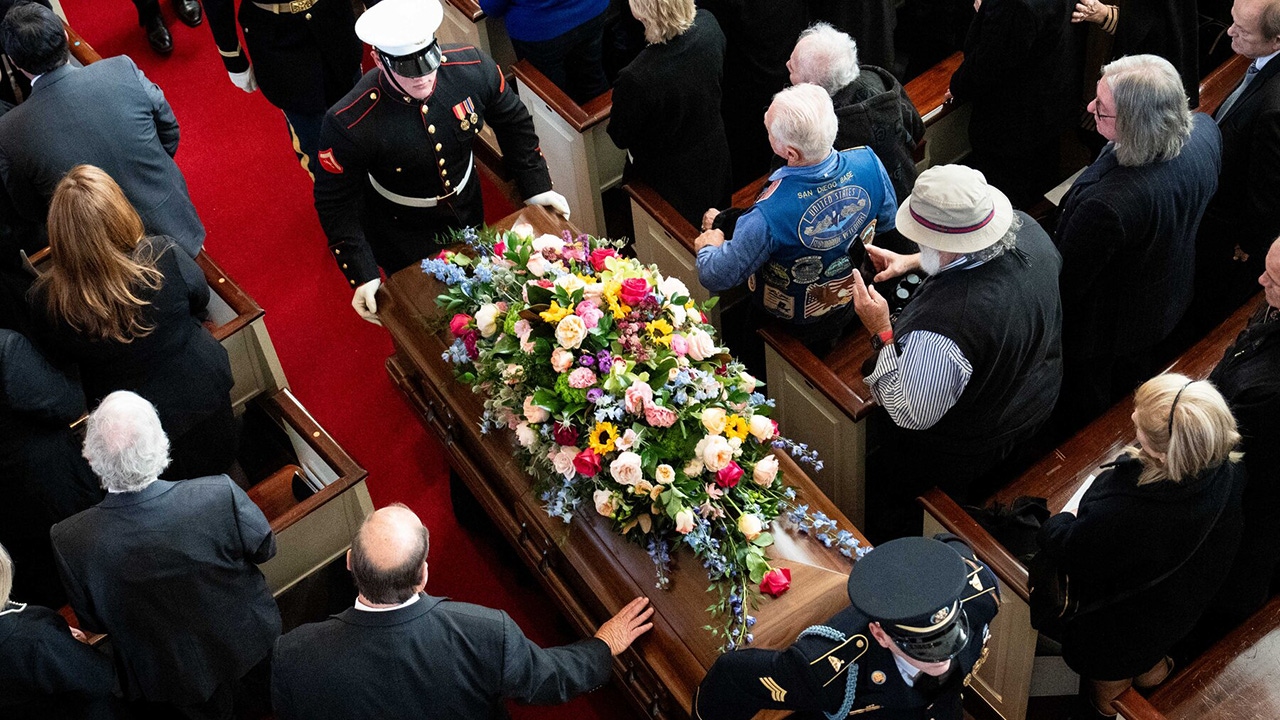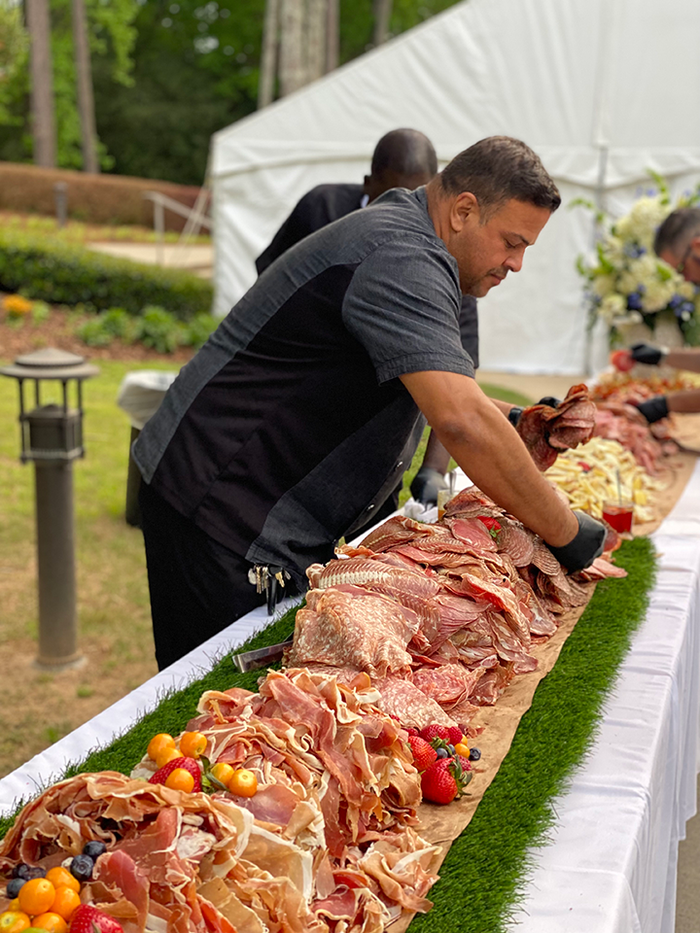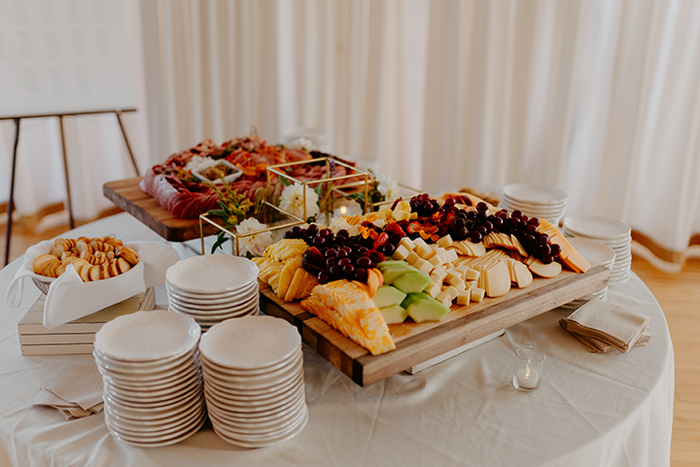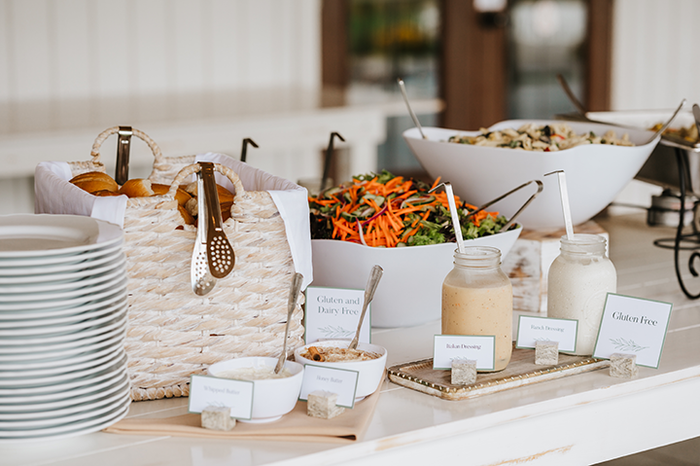The Final Farewell: Navigating the Nuances of Funeral CateringThe Final Farewell: Navigating the Nuances of Funeral Catering
In an industry often focused on celebration, funeral catering offers a unique opportunity to blend culinary artistry with compassion. Although the intersection of food and mourning may not immediately be evident, funeral catering does in fact serve an essential purpose in the grieving process. As families gather to honor loved ones, food plays a crucial role in creating a comforting atmosphere.
January 16, 2025

In an industry often focused on celebration, funeral catering offers a unique opportunity to blend culinary artistry with compassion.
Although the intersection of food and mourning may not immediately be evident, funeral catering does in fact serve an essential purpose in the grieving process. As families gather to honor loved ones, food plays a crucial role in creating a comforting atmosphere.
“Eating is important for both nourishment and as a way to bring people together during grief and loss,” said Beth Hiler (Partyman Catering*), “so we must recognize the human experience behind the event. Caterers need to bring their whole heart and empathy to what they offer.”
Support through partnership
Funeral planning presents a special kind of challenge for caterers. For starters, in many situations the client isn’t necessarily the grieving family; rather, caterers work directly with funeral homes to provide catering services. This is where coordination and collaboration with funeral directors and funeral homes becomes so important.
One approach is to create formal partnership agreements with local funeral homes, outlining services, pricing, and delivery options to ensure consistency and reliability.

Lobster-themed funeral lunch. Photo courtesy Blue Elephant Events and Catering
Additionally, caterers should prioritize prompt service, as families often require arrangements on short notice. This can often lead to challenges with securing rentals, which is why leveraging past relationships is key.
“That’s the trickiest of everything,” said Fausto Pifferrer (Blue Elephant Events and Catering*), “the food is easy, but the rentals become a problem.”
By fostering strong relationships and demonstrating understanding and support, caterers can become a valuable resource for funeral homes and grieving families.
Another challenge that caterers should be aware of is that families often don’t know how many people to order food for (and whether there are any dietary restrictions) since people don’t always announce that they’re attending a funeral.

Chef Eric Centeno of Exquisite Delites Catering Company sets a cheese and charcuterie table for a 5,000-person repast reception (Exquisite Delites Catering Company was the recipient of the 2024 ACE award for Best Off-Premise Catering for companies under $2 million annual revenue). Photo courtesy Sandra Centeno
However, the pricing for a funeral is the same as for any open-house event. Caterers will need an estimated headcount so they can prepare accordingly. Caterers always want to avoid running short on anything. In a nutshell, caterers should price funeral catering like any other event that comes through the door.
“Building rapport with grieving families is essential,” says Chef Eric Centeno (Exquisite Delites Catering Company). “By asking thoughtful questions, we can create a personalized menu that honors the deceased and comforts the living.”
Where professionalism & empathy collide
Close coordination with funeral directors helps ensure that food service aligns seamlessly with the funeral service. Providing promotional materials, such as brochures or flyers, to funeral homes can discreetly inform families of available services. Be aware of the words you use in your materials, however
“No detail is too small to consider when thinking of your client experience during this process,” says Hiler. “Are the words and information you provide appropriate for them to know, [but also] built with the tone and language for someone going through the grieving process? Names of offerings or automations that might be a point of fun or celebration for any other event may need to be altered to empathize with your client and what they and their family are going through. Be patient and be willing to navigate some frustrations since emotions are high and often out of our control.”

A fruit and cheeseboard alongside a charcuterie board from Partyman Catering. Photo courtesy Rebecca Loomis A fruit and cheeseboard alongside a charcuterie board from Partyman Catering. Photo courtesy Rebecca Loomis
As much as caterers can try and streamline operations for these short turnaround times, they also need to have a degree of flexibility while maintaining high-quality offerings and service.
“It’s easy, especially once you’ve established efficiencies internally, to forget that there is a huge emotional component that we do not have control over,” says Hiler.
Additionally, training staff to interact with compassion and empathy is crucial, as a caring approach can significantly impact families during a difficult time. Train your staff to be both attentive and discreet. They should be prepared to serve with empathy, maintaining a low profile while being ready to assist as needed. Your team should handle any issues with grace and efficiency, ensuring that the focus remains on supporting the bereaved.
“You must both be able to solve problems or logistical complications while also being as unobtrusive as possible, which can be challenging for the team if they aren’t trained to balance these concerns with the emotional aspects of funeral events,” says Hiler.
Simplifying service
There are varying degrees to approach funeral catering from a service perspective. Whereas some caterers specialize in “drop-off” menus, others go the full-service route.
“Having a range of catering services available is important when planning for and logistically handling funeral services,” says Hiler. “By acknowledging the complexities of family dynamics and expressions of grief, offering a variety of styles ensures that each funeral service receives personalized care and customization, tailored to exactly what the family wants or needs.”
Drop-off
This style of catering is one of the more frequently requested services for funerals.
“This option provides a quiet, unobtrusive way to offer a comforting meal during a sensitive time, allowing for privacy and reflection,” says May Cleary (Partyman Catering). “It is perfect for more intimate or informal funeral gatherings, where minimizing disruption is paramount, but we can still provide a thoughtful meal for grieving loved ones.”

Salad and rolls on Partyman Catering’s buffet setup. Photo courtesy Brittany Austin Photography
It is also a cost-effective choice since funeral expenses can often be a sudden stress for family and friends coordinating the services.
Casual catering
With this style of service, the catering team sets up the main meal buffet-style and stays for the duration of the meal service, usually with two to three staff members on-site to ensure everything runs smoothly.
“This option offers a comforting balance between support and privacy, making it ideal for informal receptions where a full-service approach may not be needed, but you still want a level of care and attention to make the meal seamless and stress-free,” Cleary says.
Full-service catering
Buffets are often the preferred choice here, offering guests the flexibility to choose what they want and serve themselves at their own pace.
“You wouldn’t normally do a sit down with funeral catering,” adds Pifferrer. “Some people would, but in our neck of the woods it wouldn’t be appropriate.” For more formal events, familystyle and plated meals can also be options.
“Family-style dining combines the convenience of a buffet with the intimacy of a seated meal, adding a warm, personal touch during a time of reflection and connection,” says Cleary. “This style creates a comforting atmosphere, making it ideal for funeral receptions where closeness and shared memories are central.”
Finding comfort through food
As humans, we often turn to food as a source of comfort and solace. In times of grief, a well-crafted catering menu can provide mourners with a small sense of familiarity and warmth, helping to ease their pain. It’s not just about providing sustenance; it’s about feeding their souls and giving them a moment to rest and recharge amidst the heartache.
“We must strike a balance between elegance and simplicity,” says Centeno, “ensuring that the food is both delicious and appropriate for the occasion.”

Roasted veggies from Partyman Catering. Photo courtesy Brittany Austin Photography
Opt for dishes that are comforting and easy to eat. Think of classic options like casseroles, hearty soups, sandwiches, and finger foods. These meals should be satisfying but not overly rich or complex, respecting the somber tone of the occasion. While traditional comfort food remains popular, there’s a rising trend toward gourmet takes on classic dishes. Caterers are enhancing comfort food with high-quality ingredients and refined techniques. Expect to see elevated versions of mac and cheese, artisanal soups, and creatively presented finger foods. This trend allows families to enjoy familiar, comforting flavors presented in a way that feels special and sophisticated.
“You don’t do filet mignon because those foods are not comforting,” says Pifferrer, “you switch it to mac and cheese and sandwiches—you have to make the food work for the client.”
Funeral Food
Throughout history, food has played a significant role in funeral traditions across cultures.
Some of these traditions include:
In the Hindu faith, baskets of fruits and vegetables are gifted to families.
The Amish bring a raisin-filled funeral pie.
In Sweden, Funeral Glogg is used to toast the deceased.
Rice is a symbol of life in Asian cultures and is included in all funerals.
The eating of chicken in some countries symbolically helps the soul of the dead to fly to heaven.
In China, the eating of sugar in the form of sweets or candies, distributed after a funeral, is meant to purify mourners after encountering the dead.
In Italy, funeral gatherings often feature an array of hearty foods like lasagna and risotto. These communal meals encourage shared memories and provide a sense of solidarity during times of sorrow.
During the shiva period, Jewish mourning customs involve the delivery of special platters filled with bagels, lox, and various comfort dishes. This practice symbolizes support for the grieving family.
In the southern United States, funeral food usually features comforting classics like fried chicken, macaroni and cheese, and pecan pie. They reflect a commitment to providing solace through shared meals.
In colonial America (particularly among German and British settlers) a tradition emerged where individuals would consume molasses cookies or funeral biscuits and imbibe alcoholic beverages while proceeding from the church to the gravesite.
New Orleans sees jambalaya as the preferred funeral food. The Midwest is renowned for its classic funeral hot dishes, funeral potatoes, and casseroles.
It’s important to remember that if you decide to partner with funeral homes to generate business, many of them may have pre-set funeral menus you must work within.
“Nine times out of 10 the funeral home has a set menu, so you don’t have the luxury of setting a menu or even the timeline,” says Pifferrer. “It can be hard sometimes because it seems a little bit cookie cutter.”
However, don’t be afraid if you are asked to include family recipes or traditional dishes from the deceased’s cultural background. This might involve creating a menu based on a beloved family recipe or incorporating regional specialties that hold significance to the deceased or their family.
“We can tell a story with the food while we’re serving it,” says Pifferrer.
Keep in mind that guests are not looking for a messy or heavy meal that will take away from the reason they have attended. Additionally, thoughtful table settings, such as elegant tablecloths and simple floral arrangements, can provide a sense of tranquility. Soft lighting, whether from natural sunlight or gentle artificial sources, can also contribute to a serene and calming ambience.
“It’s a time to be respectful, listen to the client, and understand what they’re going through,” says Pifferrer. “It’s not the time to push everything that you can upsell.”

Salted mini caramel tartlet from Partyman Catering. Photo courtesy Partyman Catering
Funeral catering is a special niche within the catering world, one that requires a deep sense of empathy and professionalism. By focusing on providing comforting food, respecting the occasion, and delivering your service with care, you can play a vital role in supporting families during their time of need.
“By understanding the unique challenges and opportunities of funeral catering” says Centeno, “we can provide compassionate and delicious meals that honor the lives of the departed.”
Remember, the goal is to offer solace and support through your culinary creations, helping to make a difficult time a little more bearable for those grieving the loss of a loved one.
“In many instances, catering is important but not on a family’s top priority list, so it is important that the catering company can ensure good quality food and can handle most if not all of the logistics,” says Hiler. “Our goal is to provide peace of mind, allowing families to focus on what matters most.”
*Blue Elephant Events and Catering and Partyman Catering are proud members of the Leading Caterers of America (a consortium of the top catering and event planners throughout the United States and Canada).





.png?width=700&auto=webp&quality=80&disable=upscale)
.png?width=700&auto=webp&quality=80&disable=upscale)
